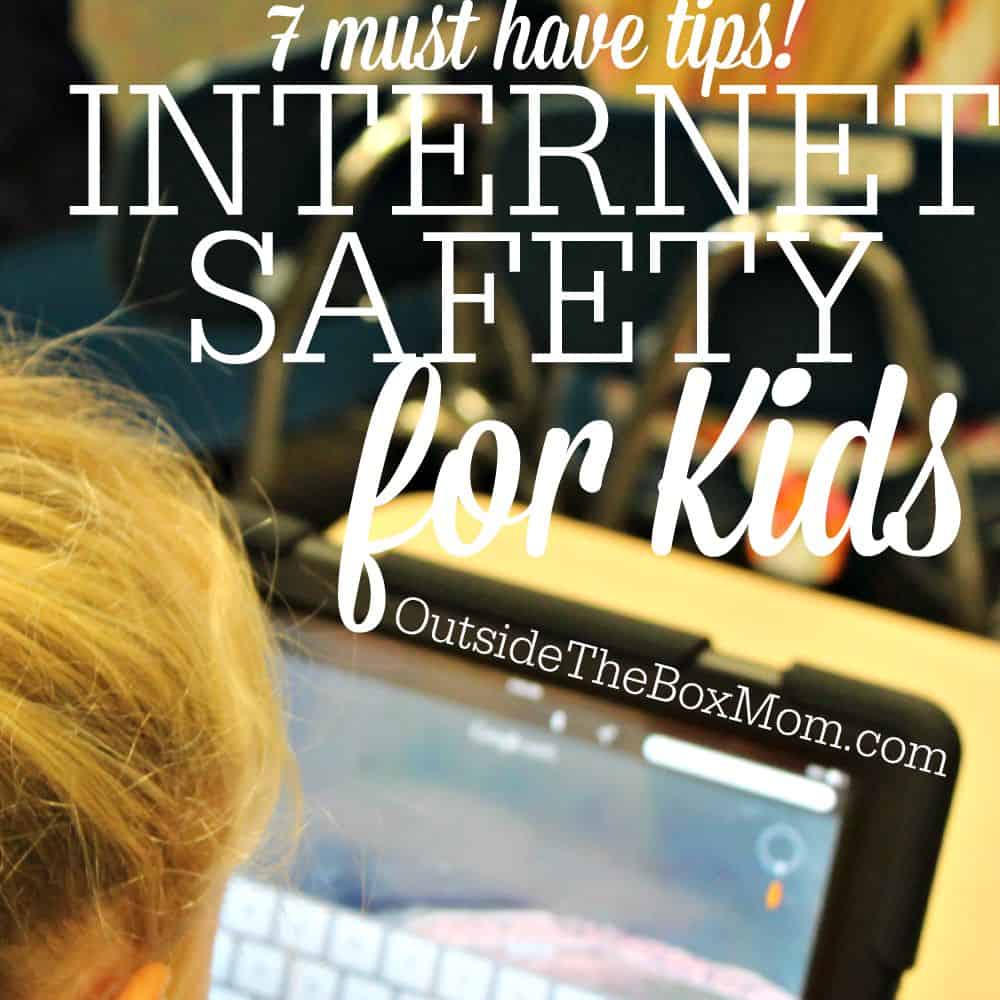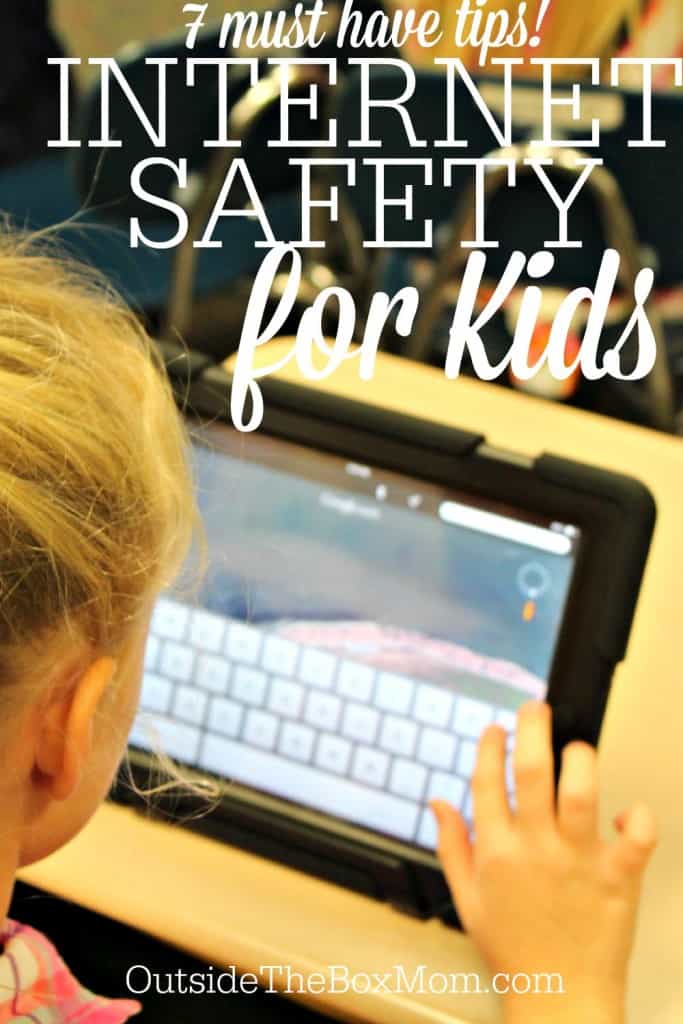Internet safety for kids is a topic that parents these days simply cannot avoid. Parents must learn how to keep their children safe online – at school, at home, and in public.
 I have a 12 year old son who has a cell phone, plays online games, and connects to public Wi-Fi. It’s a scary thought that he can be connected to anyone, anywhere in the world.
I have a 12 year old son who has a cell phone, plays online games, and connects to public Wi-Fi. It’s a scary thought that he can be connected to anyone, anywhere in the world.
Before he received his first device or was given our wireless password, we had a very frank conversation about the online dangers kids can face. I want him to make smart decisions. So, here’s what we discussed…
Teaching Your Teenagers about Internet Security
The internet has become a convenient place to find information and interact with others. Teenagers can create a profile on Facebook and connect with friends, go into chat rooms and meet new friends, start a blog and post their thoughts for all to see and the list goes on.
The issue is that the internet is not necessarily the safest place to post personal information. Here are some key lessons in internet safety for kids.
The Dangers of Wireless
Using networks that are not secure on your computer or other device is a sure way to allow hackers into your network, giving them the ability to both access and steal files and identities.
This can be extremely dangerous, depending on the types of things you keep on your computer, tablet, phone, or any other device. Anytime you use public Wi-Fi, hackers can see you and gain entry to all of your information. The details to steal your identity could be gone in seconds.
For this reason, it’s best to have a Virtual Private Network (VPN) installed on any device that you use on public networks. A VPN gives you an encrypted tunnel to send and receive information from you device to the internet. Then all hackers can see is a bunch of useless scrambled data.
If you’re looking for the best streaming vpn, be sure to look for one that can unlock international content at buffer-free speeds, secure your personal login information, and hide your IP address.
Related: Things to Consider When Giving Your Child His or Her First Mobile Phone

Browsing the Web in Public
Another compromise in internet safety for kids is that teenagers compromise their safety online without realizing it is by using public computers. There is, of course, nothing wrong with using a public computer.
However, one must be very cautious regarding the information he shares on these computers and how they choose to use public computers. Never perform any type of activity on a public computer that requires you to share personal information about yourself and identity. Also, never save your passwords on any websites you browse on a public computer.
Related: How to Keep Kids Safe Online

Keeping Information Personal
One of the most important things you can stress to your teenager is to never give out personal information online. This may seem like common sense, but there are many ways teenagers do this without even realizing.
Message boards, chat rooms, online gaming, private messaging on social media and forums give you the chance to talk to people you may not know in real life. Stress to your teen that whether they know the person or not, they should never share anything personal, because nothing you post on the internet is private.
Are Your Pictures Safe?
Many do not realize that when they take a photo with their smartphone, the GPS coordinates can be embedded in the picture, giving your current location to anyone on social media who sees the photo.
How can your teen avoid giving their location to strangers? Set all social media settings to private, so only “friends” can see what is being posted is the best means of internet safety for kids.
Also, make sure to only accept friends you actually know in real life. It’s also a good idea to be friends with and follow your kids on all of their social media profiles.
Related: After School Safety: Tips for Keeping Kids Safe until You Get Home
Staying Secure On Email
It is all too easy to get a virus or become subject to a scam or fraud through spam emails. If you are unaware of the source or person the email is coming from, your safest bet is to not open the email in order to ensure your email safety.
While many viruses simply harm your computer, others can actually steal your personal information. If you do not know the source, do not even open the email. You should definitely not open attachments.
Shopping Safely
Teens love to spend money, and one of the easiest ways to do this these days is online. You can order anything all the way from your favorite stores to Amazon and eBay. There are also tons of new online stores that are attracting the attention of teens with their flashy products and affordable prices.
The issue is, some of these places are scams that are out to steal both your money and personal information. If the website does not have a checkout that is secure and uses “https://”, stay away from it. It is better to be safe than sorry.
Raise Awareness
One of the most effective ways that you can help keep your teenager safe online is by talking to them about Internet safety yourself. Sit down with them and go over all of the rules to Internet safety mentioned above.
Do not just tell them what not to do, rather, explain the reasoning behind these things and what can happen if their safety or privacy is compromised online. The internet is great in many ways, but it can also be very unsafe if you are unaware of how to protect your privacy online.
Related: Easy Home Security
How do you handle internet safety for your kids?

This post was from Isa, work-at-home mom, tech junkie and blogger. She blogs at Securethoughts.com to empower and educate moms and WAHMs on technology and online resources.
Internet safety is such an important component in tech literacy. I hope you consider linking this important post at Literacy Musing Mondays. Here is this week’s link;
http://maryanderingcreatively.com/literacy-musing-mondays-is-growing/
Interesting post, thanks for sharing.
These are some great points to talk to the children about internet safety. Thank you for sharing with us at #HomeMattersParty. We would love to have you again next week.
It is in an easier way to ignore someone in order to say
to them “no” online while there is no in the flesh interaction. There is not any limit of technology as it really is expanding its wings amazingly and having
new milestones with almost every day. You
could miss valuable information or perhaps friend or even a
potential client.